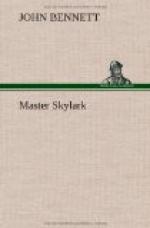“Well, lad, what be it?” asked the tanner, huskily, laying his hand on his son’s curly head, which was nearly up to his shoulder now.
“Nothing,” said Nick, with a happy smile, “only mother will be glad to have Cicely—won’t she?”
Master Shakspere came into the room with something in his hand, and walking to the table, laid it down.
It was a heavy buckskin bag, tied tightly with a silken cord, and sealed with red wax stamped with the seals of Master Shakspere and Master Jonson.
Every one was watching him intently, and one or two of the gentlemen from London were smiling in a very knowing way.
He broke the seals, and loosening the thong which closed the bag, took out two other bags, one of which was just double its companion’s size. They also were tied with silken cord and sealed with the two seals on red wax. There was something printed roughly with a quill pen upon each bag, but Master Shakspere kept that side turned toward himself so that the others could not see.
“Come, come, Will,” broke in Master Jonson, “don’t be all day about it!”
“The more haste the worse speed, Ben,” said Master Shakspere, quietly. “I have a little story to tell ye all.”
So they all listened.
“When Gaston Carew, lately master-player of the Lord High Admiral’s company, was arraigned before my Lord Justice for the killing of that rascal, Fulk Sandells, there was not a man of his own company had the grace to lend him even so much as sympathy. But there were still some in London who would not leave him totally friendless in such straits.”
“Some?” interrupted Master Jonson, bluntly; “then o-n-e spells ‘some.’ The names of them all were Will Shakspere.”
“Tut, tut, Ben!” said Master Shakspere, and went on: “But when the charge was read, and those against him showed their hand, it was easy to see that the game was up. No one saw this any sooner than Carew himself; yet he carried himself like a man, and confessed the indictment without a quiver. They brought him the book, to read a verse and save his neck, perhaps, by pleading benefit of clergy. But he knew the temper of those against him, and that nothing might avail; so he refused the plea quietly, saying, ’I am no clerk, sirs. All I wish to read in this case is what my own hand wrote upon that scoundrel Sandells.’ It was soon over. When the judge pronounced his doom, all Carew asked was for a friend to speak with a little while aside. This the court allowed; so he sent for me—we played together with Henslowe, he and I, ye know. He had not much to say—for once in his life,”—here Master Shakspere smiled pityingly,—“but he sent his love forever to his only daughter Cicely.”
Cicely was sitting up, listening with wide eyes, and eagerly nodded her head as if to say, “Of course.”
“He also begged of Nicholas Attwood that he would forgive him whatever wrong he had done him.”




